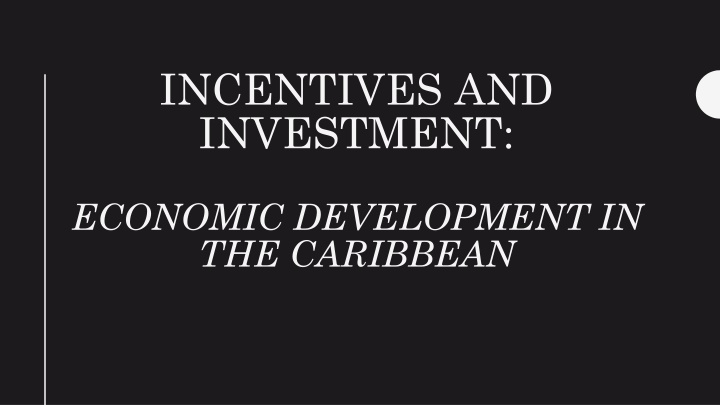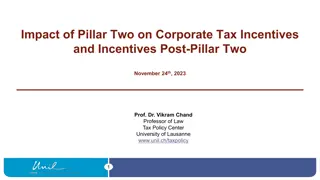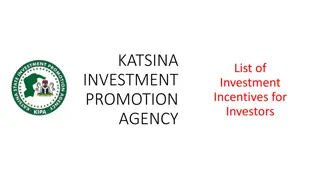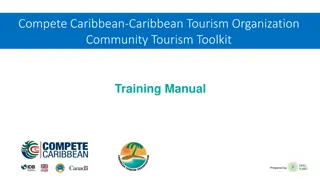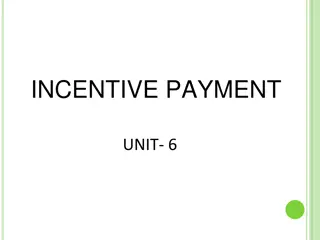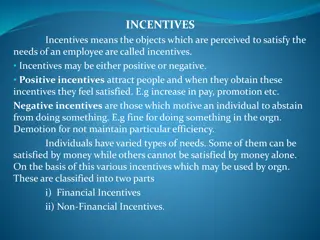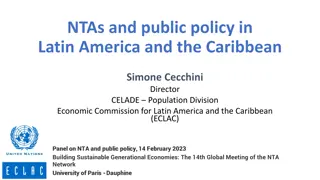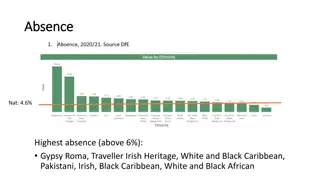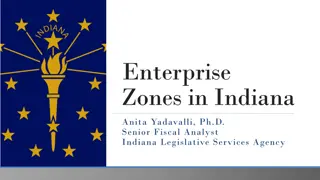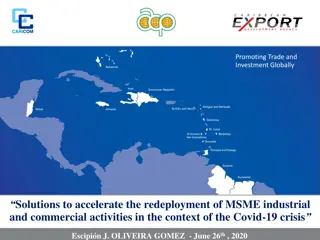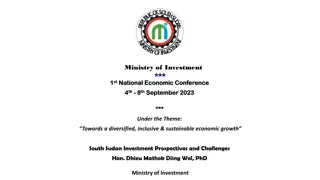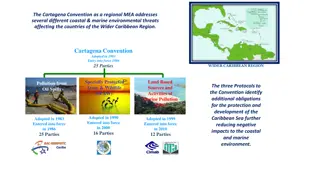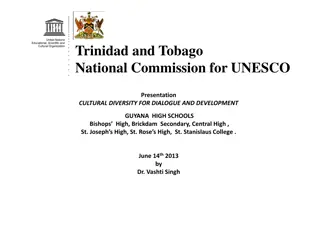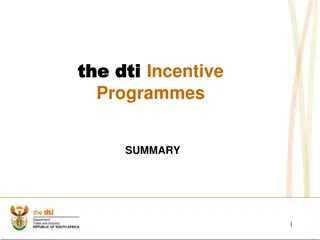Economic Development Through Incentives and Investment in the Caribbean
Travel and tourism have been significant drivers of economic growth in the Caribbean region, contributing to GDP and employment. This presentation highlights key statistics, such as the rise in GDP contribution and employment generated by the tourism sector. It showcases data on incoming tourist numbers, visitor expenditures, comparisons of air and cruise arrivals, top Caribbean destinations by hotel rooms, and the various taxes imposed on hotel operations in the region.
Download Presentation

Please find below an Image/Link to download the presentation.
The content on the website is provided AS IS for your information and personal use only. It may not be sold, licensed, or shared on other websites without obtaining consent from the author.If you encounter any issues during the download, it is possible that the publisher has removed the file from their server.
You are allowed to download the files provided on this website for personal or commercial use, subject to the condition that they are used lawfully. All files are the property of their respective owners.
The content on the website is provided AS IS for your information and personal use only. It may not be sold, licensed, or shared on other websites without obtaining consent from the author.
E N D
Presentation Transcript
INCENTIVES AND INVESTMENT: ECONOMIC DEVELOPMENT IN THE CARIBBEAN
Travel & Tourism accounted for 14.8% of total GDP throughout the Caribbean before 2014 and increased to 16.5% by 2014. Similarly, Travel & Tourism in 2014 in the Caribbean generated 15.5% of total employment, and this rose to 17.1% by 2014. The Fact that the Travel & Tourism industry in the Caribbean has played a vital role as a generator of wealth and employment across all parts of the region is indisputable. 2018
Incoming Tourist Numbers Across the Caribbean U.S. Virgin Islands
Visitor Expenditures Across the Caribbean
Caribbean Comparison of Air & Cruise Arrivals
Top 20 Caribbean Destinations by Hotel Rooms
Barbados Jamaica St. Lucia Dominican Republic Caribbean Hotel Room Stats
Hotel Operations In Caribbean Are Subjected To The Following Taxes: Hotel accommodation tax Departure tax Casino tax Entertainment tax Property tax Value Added Tax Corporate Tax Trade related taxes and non-tariff barriers More Service Charges & Other Taxes
Hotel Operations In Caribbean Are Subjected To The Following Taxes: Hotel accommodation tax Departure tax Casino tax Entertainment tax Property tax Value Added Tax Corporate Tax Trade related taxes and non-tariff barriers More Tax Comparisons
Hotel Operations In Caribbean Are Subjected To The Following Taxes: Hotel accommodation tax Departure tax Casino tax Entertainment tax Property tax Value Added Tax Corporate Tax Trade related taxes and non-tariff barriers More Tax Comparisons
-Custom Service Charges -Consumption Taxes -Stamp Duties
Trinidad and Tobago Dominican Republic Jamaica Barbados St. Lucia Guyana Belize Dominica Suriname St. Kitts and Nevis Antigua & Barbuda Grenada Bahamas TAX INCENTIVE PROGRAMS THROUGHOUT THE CARIBBEAN
Barbados The Government of Barbados has a very aggressive program that identifies and promotes investment within the hotel sector. Barbados has a well defined range of business and incentives legislation and an extensive array of double taxation and bilateral investment protection treaties with the United States, Canada and several European countries. There are no restrictions on foreign ownership but non-nationals are required to obtain work permits.. The Tourism Development Corporation (TDC) is a local organization composed of voluntary corporate members whose contributions are dedicated to local tourism improvement projects (either product development or marketing), and for which the contributing company can claim a 150% tax rebate
Dominican Republic The tourism industry in this CARIFORUM destination creates direct employment for 233,000 persons. The Dominican Republic has a mixture of natural, cultural and historic resources that make the country an ideal destination for tourism.. These incentives are creating investment opportunities in: Upgrading of existing hotel establishment. Remodeling and reopening of hotel establishments. Building new hotels in keeping with the island's characteristics Improve present tourism support services Create tourism information centers.
Jamaica The Jamaican Government has Double Taxation treaties with 12 countries. Investors from these countries benefit from favorable income tax treatment. Apart from the Hotel Incentives Act, Jamaica has a Resort Cottages Incentives Act, short- term incentives packages and concessions for special attractions. The Resort Cottages Act encourages small type resort operations of 10 rooms or less, owned by a local and situated within the same district, village or town. A seven years tax holiday is awarded to applicants who qualify, along with seven years duty free imports.
St. Lucia Tourism Incentives Act enables a person interested in Tourism investment to apply to the Minister of Tourism for concessions to develop a product. Tourism projects must go through an approval process which involves: Interim approval granted based on information submitted in the initial application. This information must include evidence of ownership of project, estimates of expenditure, source of funds, environmental impact assessment, marketing plan and feasibility study.
Antigua & Barbuda The country's Fiscal Incentives Act contains several provisions that facilitate new investments in the hotel sector.. Access to domestic financing in Antigua & Barbuda is facilitated via commercial banking sector with interest rates of 11% and 13%.
Bahamas The government of the Bahamas has established a national investment policy, with their main function being the administration and management of the The Tariff Act The Free Trade Zone Act The Hotel Encouragement Act The Hawksbill Creek Act A politically stable country which encourages private investment. Efficient and dependable Public Service. Tariff concessions under the Caribbean Basin Economic Recovery Act. Essential and efficient infrastructure such as ports, airports, roads and communication systems. An investment climate which is free of capital gains tax, withholding tax, profit remittance, personal income, dividends, and payroll and interest taxes. Extensive air links to the United States.
Dominica The Dominican government has started a well-defined campaign to promote private sector development and encourage foreign investment. The priority areas are: Tourism Light Manufacturing Offshore Financial services Information and communication technology Agro processing Access to domestic financing is mainly through commercial banks, at rates from 11% to 14%.
Grenada The Hotels Aid Act of 1954 is now replaced with a more comprehensive Tourism Development Act. This new Act provides the frame work for the sustainable development of Grenada's hotel sector by making it more attractive for local and foreign investors. Access to financing in Grenada is mainly through the commercial banking sector at interest rates ranging from 11% to 13%
St. Kitts & Nevis St. Kitts and Nevis has legislation under the Fiscal Incentives Act which actively attracts and encourages hotel investment. . . Financing for hotel projects can be obtained from the following financial institutions at rates up to 11%
Trinidad & Tobago Trinidad and Tobago has a strong economy dependent on services and oil production. The tourism sector in Trinidad and Tobago currently represents more than 5% of the country s Gross Domestic Product. Progressive investor-friendly legislation has been enacted to support the development of the tourism sector . . The Tourism Development Act 2000 was introduced to stimulate tourism development throughout the island. The Hotel Development Act provides incentives to hotel owners and operators. These incentives include: This country is referred to as the financial capital of the Caribbean, and the cost of borrowing is 7.5% to 9.5%.
The three main types of incentive programs: Statutory provisions which create and offer tax holidays or relief from income taxes for a set period. Most of the Caribbean countries have a Fiscal Incentives Act, Hotel Aid, Tourism Incentives Act, and Development Aid Act. The Virgin Islands offers the same acts, aid, and additional incentive programs Exemptions from import taxes on inputs being imported into the country. (Some exemptions may take the form of Cabinet Conclusions or legislation while other may be at the discretion of high level government officials). Special Incentives packages which are negotiated with Cabinet members which can include Government guarantees, discounted land deals, or specific infrastructure development.
Virgin Islands Tax Incentives Program
